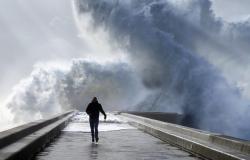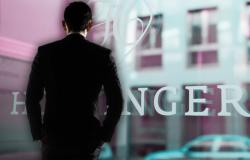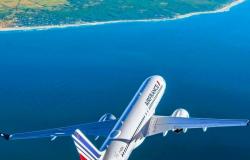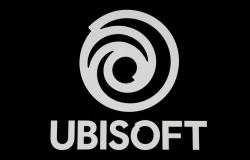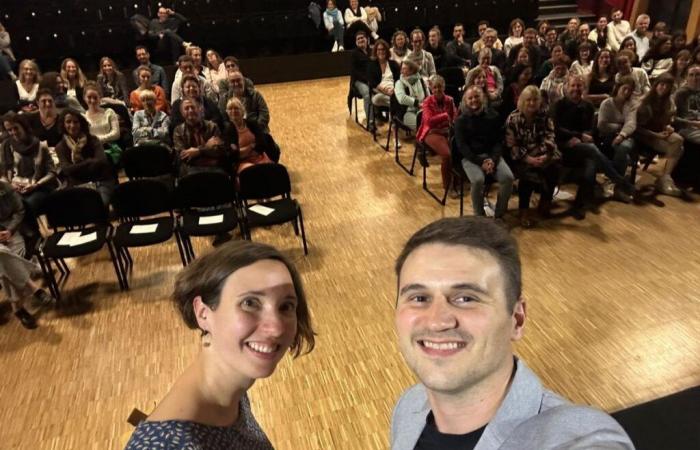
Un months in a wheelchair with only one good hand, inevitably we go in circles, it motivated us to walk again! » Looking at the video clips circulating on the internet, there is no doubt that Louis Gustin and Élise Mathy, victims of a stroke while they were students, are not the type to feel sorry for themselves. Humor and self-deprecation are the trademark of this couple who will host an unusual conference show on Saturday 1is February in Ruffec (1): “Welcome to aphasia”.
A title that sounds like the discovery of an unknown land, as this speech disorder, resulting in particular from a stroke, goes under the radar. Louis Gustin and Élise Mathy highlight this through their journeys, as young parents of little Elias. A conference organized by Marathon de parole, the association created in North Charente, South Vienne and South Deux-Sèvres to allow people with aphasia to create exchanges and find social connections. Questions for Louis Gustin.
The editorial team advises you
In “Welcome to Aphasia”, you depict your journey after the stroke that struck you in 2015, at the age of 24, while you were a student of European law. What happened?
Louis Gustin. I was celebrating the first anniversary of my graduation with friends in a café in Warsaw where I had studied on Erasmus. Within seconds, I saw everything green and I couldn’t speak. When I woke up, I still couldn’t speak, I was told I had aphasia without knowing what it was. The words were in my head but didn’t come out… It took me years of speech therapy to gradually start speaking again. I still have sessions from time to time. These conferences were a challenge for me: at the beginning, I only lasted 20 minutes, today I last an hour. This is an exercise that helped me.
You share the stage with Élise Mathy, your partner, met on the Facebook group “stroke young survivors”, struck by a stroke when she was in 9e year of medicine… This is not the profile that we spontaneously think of among stroke victims.
It affects anyone, including younger people! We met many young people with aphasia during our conferences and projects. It’s hard to imagine but I know a baby who had a stroke at 19 months, a child at the age of 7 who managed to study and can walk. Élise was able to continue her medical studies and is today an endocrinologist at the Alpes-Léman hospital. Meeting him gave me more hope, a purpose in life.
On stage, Élise jokes by talking about your meeting when you hardly spoke: “picking me up was complicated, fortunately he was handsome”. Are humor and self-deprecation part of resilience?
Yes, these conferences allowed me to express my feelings but I didn’t want to make it something sad. Laughter is important. I laughed a lot at my sentences where words were missing. For example, I knew how to say “cat”, I could say “the cat is black” but not “the cat who ate the mouse is black”. Speech was the hardest to recover, the first two years were difficult. My great-niece, who was born five days after my stroke, had the same language level as me when she was born!
-That didn’t stop you from touring Europe in a Berlingo in 2019 to give conferences.
Touring Europe in a van was an old dream. I have quite a few European friends I met during my studies in Warsaw. I was able to give conferences in French in France and Switzerland and in English in other countries. It served as a bit of re-education for me to relearn how to speak on the phone in particular. Since my stroke, I always say to myself: “you need to meet people, you shouldn’t stay moping all alone in your corner”… It gives me a boost! Like the comic strip that we are going to release in April 2025 with Élise and a designer, “AVC”, at Glénat, to tell the story of our rehabilitation. It’s another way to show that life is possible after a stroke. Many people with aphasia come to see us at conferences, but also able-bodied people who say “well done”.
A member of the Marathon de parole association confided last year “when you can’t express yourself and what’s more in an armchair, people take you for a sucker”. Is one of your motivations also to change the way others view disability?
Yes because many people don’t know what aphasia is. When we cannot speak, we are wiped off the map even though we understand what is happening around us. There is a lot of work to be done to make this disability known. Large oral exams are organized for people who stutter. Why not for aphasics?
You host conferences across France, have been in charge of the disability mission at the Ministry of Solidarity for three years, carried the Olympic flame last July with Élise… What are you most proud of today?
From my 19 month old son, the best gift Élise gave me! Elias is in good health, he goes to daycare, sleeps well, is toned and repeats our words… We had fears before he was born, we were afraid of not being able to change him or carry him with our two two good arms. But these are surmountable difficulties. A great childcare assistant showed us how to do it, even if it gave me lumbago!
(1) Saturday 1is February at 3 p.m. at the Family cinema in Ruffec. Free, register on 06 70 95 62 06.

